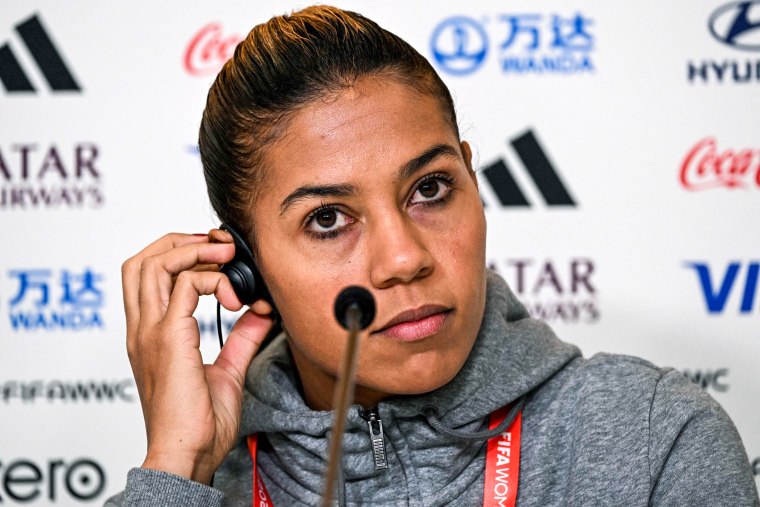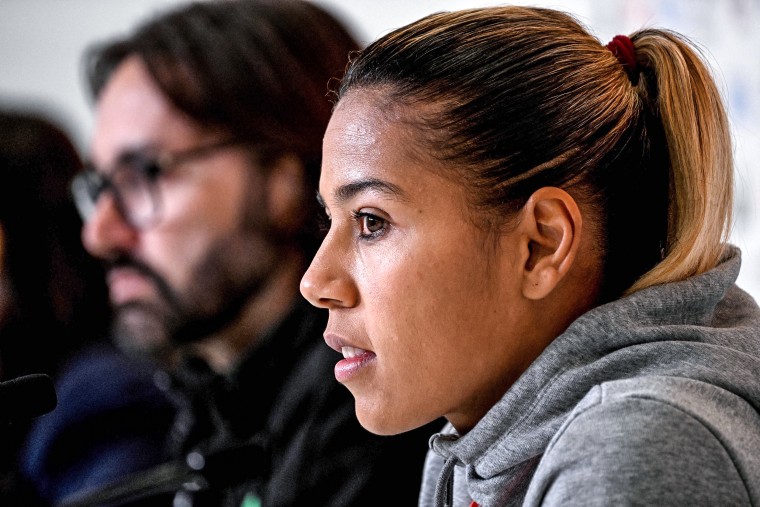British broadcaster BBC apologized Tuesday after one of its reporters asked the captain of Morocco’s Women’s World Cup team whether any of her soccer teammates are lesbians.
“In Morocco, it’s illegal to have a gay relationship,” the journalist asked player Ghizlane Chebbak at a news conference Sunday. “Do you have any gay players in your squad, and what’s life like for them in Morocco?”
Morocco is one of at least 67 countries where same-sex intimacy is criminalized, according to Human Rights Watch. Moroccans who violate the law could face six months to three years in prison, according to the international advocacy group.
Chebbak grimaced and removed her earpiece in response to the question before turning to her coach and laughing. An official of FIFA, the international soccer governing body, interjected before Chebbak could respond, saying the question was “political” and instructing reporters to “stick to questions relating to football.”
“No, it’s not political,” the reporter replied. “It’s about people. It’s got nothing to do with politics. Please let her answer the question.”
The moderator ignored the reporter’s remarks and allowed a last question from a different reporter before ending the presser.

On Tuesday, a BBC spokesperson called the question “inappropriate” and said the news organization “had no intention to cause any harm or distress.”
The Moroccan Football Association did not immediately respond to a request for comment.
Other reporters who were in the room condemned the question on social media.
“The reporter was completely out of line,” CBS Sports reporter Shireen Ahmed tweeted Saturday. “Harm reduction matters and posing the question to the captain or coach was unnecessary. The question was waved off by a FIFA media officer moderating but it shouldn’t have been asked.”
The incident wasn’t the first time the British broadcaster — the nation’s oldest and world’s largest — has been in the hot seat about LGBTQ issues in recent years.
The BBC faced widespread criticism from LGBTQ advocates for publishing an article in 2021 titled “We’re being pressured into sex by some trans women,” which critics said painted all trans people as sexual predators. And just last month, it faced criticism from some activists after it reissued guidelines that discouraged its journalists from attending LGBTQ Pride events that could be considered “overt” protests to stave off accusations of bias.
A record number of openly LGBTQ players are competing in this year’s Women’s World Cup tournament. According to the latest tally from the LGBTQ sports website Outsports, at least 94 out athletes will compete this year, nearly 13% of the tournament’s 736 players. Australia has the most out players, 10, and Brazil and Ireland come in close second, with nine each, according to Outsports. No Moroccan players are on Outsports list of openly LGBTQ players.
Morocco’s match Monday marked the first time a team from an Arab and North African nation played at the Women’s World Cup. The team lost to Germany 6-0.

